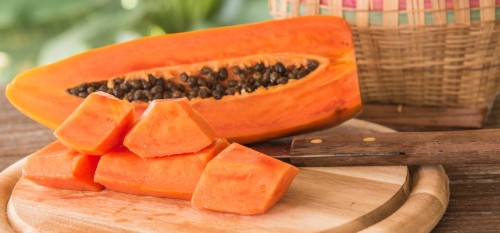by Deepthi Krishnamurthy
It was time to check on the papaya. Geeta had been putting it off for days. She dragged her feet as the nurse took her on walks. Passing the dining table, she looked at it from the corner of her eyes- the large fruit sat alone in its cane coffin.
People had been visiting since she returned from the hospital last week. She had been somewhat happy initially but soon noticed their fears masked in awkwardness. Relatives came with a heavy sense of responsibility. Old uncles and aunts who used to forget her name when she was a child now recommended doctors and birthstone rings. Neighbors who gossiped about her listened to the nurse with calculated anxiousness, “Creatinine is high, BP is fluctuating. Dialysis? Madam decided to stop. She wanted to come home. You know… be in peace.”
When Krishna came, he squatted on the floor like a child disciplined to a corner, letting tears roll down. He was old, back bent and bones asserting their presence under wrinkling skin. She recognized her own shriveling body and its bleak prospects in his tears. Seeing him brought agony and curiously, a semblance of meaning.
She wasn’t old but had sampled old age in the past months. She had had samplings of a lot of things. Marriage that lasted a year before the smashing vases and ringing slaps forced her to end it. Motherhood that lasted two days before the child, a girl, succumbed to jaundice.
Krishna’s eyes now performed a condensation, turning her samplings into droplets of tears. Perhaps he would be the only one to cry for her like that, wailing soundlessly.
When he didn’t come, Krishna seemed like a mythical creature, a relic from her childhood on the farm. But he would appear, usually on Sundays, as if to become real. For years, he had been bringing her a monthly load of fruits, especially papayas. On principle, he refused to accept jam, jelly or pickle in return, saying “I’ve come to give, Amma, not to take.” He came with the pretext of doing odd jobs for a nominal salary that barely covered his bus charge. He used to be a nimble young man working mechanically in her father’s farm. For decades, she had never seen him show an emotion other than gratitude. A grin, folded hands and a deep bow defined him.
When her father sold the farm, Geeta had cried for days, insisting they take Krishna with them to Bangalore. Instead, her father put in a word to the new owner to keep him on the farm. For this, Krishna felt the need to repay her with the fruits for as long as he lived. When she was a child, he brought things every week – country beans, gourds, guavas and papayas – things he grew around his hut without being asked to, things nobody cared about. They grew easily and without fuss so nobody mourned the overripe papaya that was thrown away. He used to bring them to the backyard of their house when she was little, just as he does now to the threshold of her kitchen. In those days, Geeta’s mother would grumble and say that it was not required. He didn’t have to. But Krishna would fold his hands and bow, as if requesting the goddess herself to accept his offerings.
As a child, Geeta had sneaked into his hut one day. She advised him and his family in an eloquent speech, saying that their loyalty was wasted on her family, revealing that her mother sometimes threw away his produce. She saw him laugh for the first time. Her speech didn’t change anything. The folding hands, bowing and offering continued. Today, body quivering in small convulsions, he sat before his basket of papayas. “Please take this Amma.” he said.
”I won’t be needing these anymore, Krishna. You’ll have to take them back this time. I’m not even supposed to eat them. Ask Nurse if you want,” Geeta said.
“Can’t she have a piece, Nurse-amma? She has always liked papaya, even as a little girl,” Krishna begged.
By evening he wiped his tears, folded his hands and bowed one last time. He had left one large papaya on the dining table.
Three days had passed since. From yellow-green, the papaya had slowly turned yellow-orange. Yesterday, it had been a flaming fire. But yesterday Geeta had been oscillating between mentally groggy and physically tired. She didn’t feel like eating the fruit even when the nurse confirmed that she could eat a piece. She had lost the taste in her mouth. Today, the fruit had developed large white patches that were powdery and tender. Her own skin was forming white patches. The doctor had been surprised that she was thinking of her skin, of all things. “Just side effects,” he said and scribbled on his pad. “Apply this cream if it bothers you.” It clearly didn’t bother him.
The papaya had sores and wounds too. Soon its flesh would melt into the newspaper covering. A pungent fruity smell would signal its final struggle before its insides trickled, weaving into the cane basket’s gaps. It would fall into a bed of discarded waste – prickly pieces of silver tablet foil, plastic sheets that once protected pink and white tablets, dark brown bottles of syrups and rolls of fallen black hair. The fruit, heavy with juice, would fall, rupturing its skin and spilling liquid. Its flesh would break readily into chucks, barely resisting the violence of being chucked unceremoniously. There might even be a solemn dignity in resisting so little.
Under the layers of indistinct numbness, she felt a sharp twitch. The thought of wasting the fruit pained her. She propped herself higher in her cane chair letting her feet slide down the ottoman. Unsteady at first, she slowly stood up. The nurse wouldn’t be here for another three hours. “Plenty of time,” she thought, like a child plotting a prank.
Like visiting a dying friend, she approached the papaya. She tied her frail but still black hair into a knot. The fruit was surprisingly firm for its ripeness. She remembered her grandmother’s tip, “Ripe and ready to eat, you’d think. But don’t be tempted to make that jam just yet. Wait for a whole day. Let it get… what shall we say? desperate to preserve itself.” It was a bright orange and cried out to be preserved in its best color. It took her some effort to carry it to the sink. She washed its wounds and ran her wrinkled fingers over its firm skin. There were deep orange solar spots, some greenish reminders of its youth and dabs of red screaming for help, not accepting death.
The juice dripped onto the chopping board as she slid the knife under its skin, revealing a glistening surface in the late afternoon light. The peel separated. Its surface was the palette of a mad artist painting a bizarre landscape. She let the knife dig in, opening a treasure chest of translucent black seeds. Little eyeballs looking at her with hope. Under them was a throbbing network of light orange veins.
She worried about the time. After dicing the fruit into chunks, she mashed them with a wooden masher. A gentle aroma oozed out. She rolled a lemon on the chopping board to soften it. She hoisted the open pressure cooker onto the stove. The kettle she had already started wobbled and whistled. She made a water bath for the jars, pouring water carefully with a practiced control that had now become part of her, like her little away-from-the-body movements, like breath. Jars and lids were laid out to dry.
Her mind was in tune with the process, like dancing to an ancient rhythm. Her arms tightened in preparation for the stirring. Soon the bubbles started to form and the hot liquid splashed. A solar flare. She had to keep up with the stirring or turn off the gas and rest. All the while the fruit deepened into a reddish orange. She went over to the living room and slowly dragged her cane chair to the kitchen.
Her eyes darted towards the door as she sat down to rest. She didn’t have much time. It was nearly done. She didn’t need to test it. From the color, the firmness and from how much her arms ached, she could tell it was done.
She sat down, sweating profusely while a thrill moved in her body. Everything cooled under the fan and the jars were dry. She poured the jam into the jars, tapped them and waited for little bubbles to escape, like burping a baby.
Time was running out. She left a note for the nurse to hand the jars to Krishna when he came again, her final hands-folded-with-a-bow to him. Her breaths became short as she sank into her own cane coffin. Sharp pains screamed out. Her world wobbled and then it opened and closed, like breath. Finally, there was an orange opening, a solar flare. A heaviness left her mind and body and so had life.






